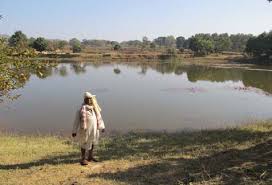

More than five years after Manoj Prasad wrote about him,Simon Oraon was nominated as Brand Ambassador of the state government Rural Development Department run Water Harvesting Mission in Jharkhand.
An announcement in this regard was made by Jharkhand Rural Development Minister Neelkanth Singh Munda today while inaugurating the two day wwork shop on Agriculture Irrigation Project in Ranchi on Saturday.
Oraon was popularly called Parha Raja alias Baba Padamshree.
In fact,Manoj Prasad,Editor of www.jharkhandstatenews.com,had written an article on Simon Oraon -A 73-year-old who saves rainwater and jungles- in the Indian Express on December 3,2010.The article,available on Google
Growing up in Bero, a tiny village situated 30 km from Ranchi, Simon Oraon realised that irrigation water was what his native Chhotangapur region needed the most.
The septuagenarian, therefore, spent most of his life mobilising villagers to build dams and ponds. He has also planted thousands of trees to regain forest cover.
While Oraon’s family owned eight acres of fallow land, he grew up seeing his relatives grow a monocrop of paddy for want of water. The forest cover was lost to felling of trees by the timber mafia. In the post-monsoon period, most villagers migrated to distant areas in search of jobs, leaving behind the old and infirm to fend for themselves. And when sometimes the monsoon failed, drought caused hunger and even death.
Soon after leaving school as a Class IV dropout in 1961, Oraon wanted to set things right. “I felt compelled to resolve the problems of deforestation and water crisis,” said the farmer, now 73.
During the rains, Oraon walked miles in the opposite direction of the streams’ flow to trace their origin. Once there, he mapped the contour of the rainwater falling from top of the hills . “In the undulating terrain, water gushed out creating ravines. I thought if a dam is built somewhere near the foothills, that water can be blocked and used for irrigation with the use of canals on the plains,” said Oraon.
Soon, with the help of fellow villagers, he constructed the first dam of earth near Gaighat in Bero in 1961. The dam, however, caved in next monsoon.
Undeterred, he reconstructed the dam. This time too, it failed to withstand the strong current of water. The third time the state water resource department intervened and increased its height and width. “This worked. So much so that the dam has not developed any crack till date,” said Oraon.
Later, without any help from the state government, Oraon led his fellow tribesmen to build one dams each at Deshbali and Jharia, and five ponds — at the six villages of Hariharpur, Jamtoli, Kaxitoli, Baitoli and Bhasnanda villages — linked to the dams. The dams and ponds trapped rainwater at the start of monsoon by diverting streams. That water was channelled through canals to the fields.
To ensure that soil erosion did not affect the water bodies, Oraon planted more than 30,000 trees of sal, jackfruit, jamun and mango.
“People scoffed at me when I first presented the idea,” said Oraon. “Officials were apathetic and villagers were not ready to part with an inch of land for submergence in the water of the dam. I won them over by using my own land and by ploughing the barren land of others for those who lost the land in dams.”
Thanks to him, 1,500 families reap three crops of vegetables besides paddy every year now from nearly 2,000 acres of land. Migration has become a thing of the past. In addition, Bero also has a mandi from where 15,000 tonnes of vegetables worth 15 lakh are transported to Ranchi , Jamshedpur , Kolkata and Bhubaneshwar every month.
“Due to Oraon, we are leading a comfortable life and our children are going to school,” said Richard Lakra, a farmer.
Oraon’s more than 60 years of work has been acknowledged in a dissertation by Sarah Jewitt for her PhD degree at Department of Geography, Newnham College, University of Cambridge and also by the Xavier Institute of Social Service, Ranchi. The state government recently awarded him a citation and Rs one lakh. “His name was recommended for the award of the Padma Shri,” said Secretary, rural development, Santosh Kumar Satapathy.
Sadly, none of the six villages where Oraon works are yet to be connected by all-weather roads and electricity remains elusive.
Oraon, however, said: “As long as I have the energy,I will tell every body that a green revolution can be ushered anywhere in Jharkhand by harvesting rainwater.”